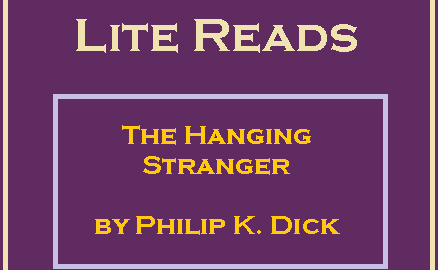Lite Reads week nine comes to a close, as we finish with our short story selection The Hanging Stranger by Philip K. Dick. Throughout the week there have been questions as food for thought on social media as people had the chance to read it and think about it. Before I announce the next Lite Reads selection (October 14), I will be sharing my own thoughts right here. As usual, spoilers ahead for those who haven’t read it yet.
The Hanging Stranger opens on what seems to be an idyllic little town. That is until Ed Loyce sees the corpse of a man he doesn’t know dangling from a lamppost. No one else in town seems to notice the body, and when Ed points it out they act as though it is completely normal. I think going from idyllic to sinister so quickly really sets a mood and also puts the idea in the heads of the readers that things can and will turn from normal to disastrous in very little time. I think Dick (who often used social issues and political undertones in his stories) was also fully aware of the underlying message he was sending through these opening events as well; even when people can see something bad has happened, they would rather close their eyes to the violence.
The story has such a tense burn as it builds from the discovery. When Ed is picked up by the police for reacting to the body, the conversation with them feels off, and Dick employs some mystery writing skills by having Ed pick up on what the reader might not have–the police claim he missed the explanation despite everyone else claiming they didn’t know why the body was there but simply accepted it. Dick is able to build the tension in a way that any horror writer should aim for, and when it is finally revealed that there are mind-controlling insects that have taken over the town (and missed Ed because he was in his basement), it feels appropriately shocking and frightening. This reveal also lends itself to the socio-political messages; the mind control insects have thoroughly taken over the local police and government, both of whom are tools to enforce the rules of the new leaders and to prevent anyone who may object, anyone who isn’t controlled, from doing any damage to their system.
The final conclusion of the story is incredibly clever, in my opinion. As Ed runs to the next town for help, the townspeople there have already succumbed to the mind control. When Ed reveals what he knows, and his theories about their apocalyptic plot, the creatures are able to learn their own weak spots, as well as root out one of those missed by the mind control. The story ends on the insects hanging Ed in the town square to root out any of those missed in this new town, with another man coming out to find the hanging corpse of a stranger, Ed Loyce. The notion of using hanging criminals or traitors to ward off others from committing similar acts is one that has persisted through history, both in fiction and in reality. The death penalty is often said to be a deterrent to committing serious crimes, but it is interesting to see it used here to discover who hasn’t been controlled. The creatures use the bodies to discover dissenters.
The Hanging Stranger uses science fiction, horror, and mystery elements to weave together a story of impending apocalypse. It also carries strong socio-political undertones. These undertones would have been incredibly relevant in 1950s America given that lynch culture still thrived and the Civil Rights Movement was in its infancy. In today’s world, it still feels relevant with police shootings and government corruption being a large part of American society today. It’s interesting to see stories like these where the painful political aspects still feel relevant. This gives Philip K. Dick’s story a timelessness that I think he would likely find unfortunate. Regardless, this story is an excellent example of short sci-fi stories written for magazines in the fifties, and an excellent example of short fiction in general. I also think it suits October’s spooky mood and Halloween themes well.
I hope everyone who participated by reading the story and following along on social media enjoyed themselves. If you have more thoughts to add, please feel free to comment on this post, or anywhere on The Feminist Bibliothecary’s social media. Week ten begins tomorrow, October 14, with a brand new short story selection!
